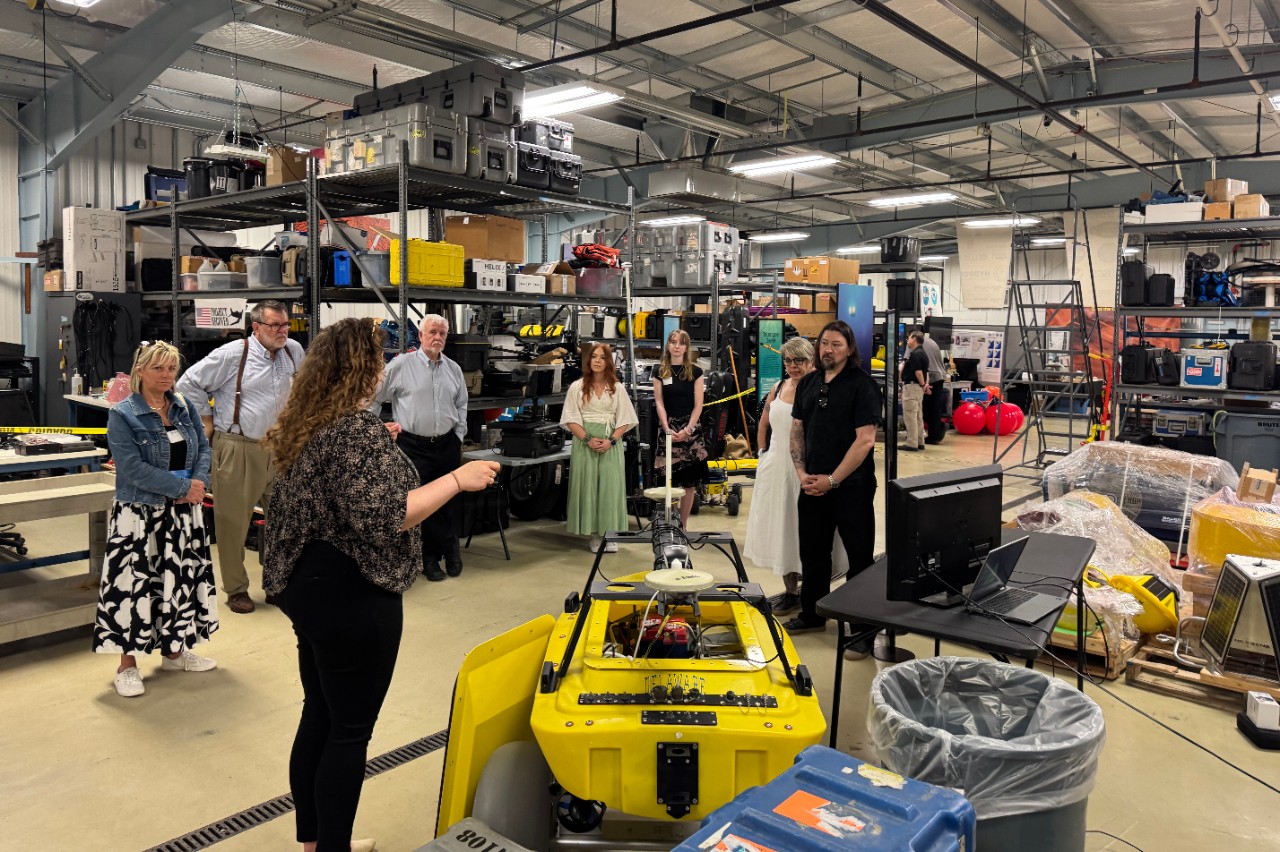
Category: Earth, Ocean and Environment

Exploring the Depths
June 30, 2025 Written by Adam Thomas | Photo by Art Trembanis
On Saturday, May 3, the University of Delaware’s Mariners Program and the Philadelphia Chapter of the Explorers Club presented a captivating symposium, “Exploring the Depths: Underwater Robotics, Maritime History, and Shipwrecks,” on UD’s Hugh R. Sharp Campus in Lewes. The event ran from 3 to 9 p.m., bringing together science, storytelling, and seafaring adventure.
The symposium offered guests a firsthand look at the cutting-edge research and technology developed by the College of Earth, Ocean and Environment (CEOE). Visitors took guided tours of the Robotics Discovery Lab, as well as the research vessels R/V Hugh R. Sharp and R/V Joanne Daiber. The day concluded with a dynamic Explorers Club Lecture Series featuring renowned speakers, including UD Professors Dr. Art Trembanis and Dr. Mark Moline, and world-renowned maritime archaeologist Dr. James Delgado.
The Explorers Club, founded in 1904, is a global network of scientists, adventurers, and thought leaders dedicated to the advancement of field research, exploration, and the preservation of the natural world.
Dr. Trembanis, a professor in the School of Marine Science and Policy, said the event embodied the spirit of CEOE.
“It brought together our scientists, students, and members of the Mariners Program and the Explorers Club to share stories of exploration and discovery,” Trembanis said. “Events like this remind us how powerful it can be when we open our labs and research to the public and invite others into the adventure.”
Dr. Delgado, a pioneer in maritime archaeology, has worked on high-profile projects around the world—from shallow coastal wrecks to leading the first scientific mapping of the Titanic site in 2010. He also played a key role in identifying the Clotilda, the last known slave ship to arrive in the United States.
His talk focused on the forensics of shipwreck identification, highlighting three emotionally resonant examples where identifying wrecks brought closure to families, reshaped the historical record, or forged moving connections between past and present.
“My talk pointed to the exceptional work done at the University, and by Drs. Trembanis and Moline—not only in the technology and methodologies they employ, but in the powerful human connections they help create,” said Delgado. “Their work is of deep meaning to many in the public, especially families with historic and often tragic ties to the sea.”
Catherine Hughes, a Ph.D. candidate in the Department of Earth Sciences, gave tours during the event and shared her own research, which explores how human activities like dredging and vessel traffic affect sediment distribution in rivers like the Delaware and Hudson.
Hughes said the event offered a unique opportunity to engage with both professionals and the public.
“I made several great connections at the symposium, and the most valuable part was sitting down over dinner with such a wide variety of people,” she said. “I received thoughtful advice, learned about areas of the field I hadn’t considered, and was inspired by attendees outside the sciences who came simply to learn.”
She noted that Delgado’s lecture left a lasting impact.
“Before the symposium, I didn’t know about the Clotilda’s story,” Hughes said. “Dr. Delgado’s ability to describe the horrific conditions endured and use spatial data to make it real was powerful. I was especially moved by the focus on how marine surveying can bring peace and closure to families—something we don’t often emphasize in scientific discussions.”
About the Mariners Program
Mariners is a University of Delaware community based in Southern Delaware, united by a passion for scientific discovery, a love of land and sea, and a commitment to preserving the coastal beauty of the region. Upcoming events include a tour of the R/V Hugh R. Sharp on Wednesday, July 2.
For more information about Mariners, contact Alumni Engagement at alumnet@udel.edu.
